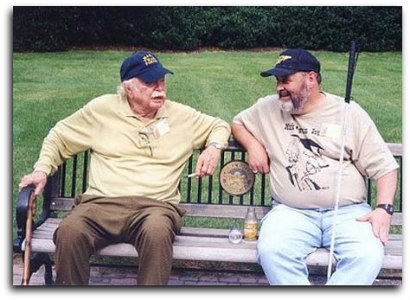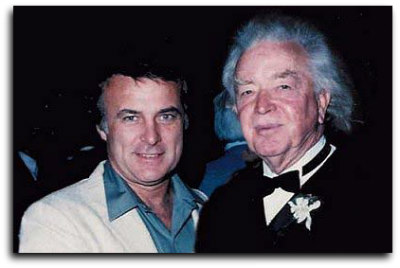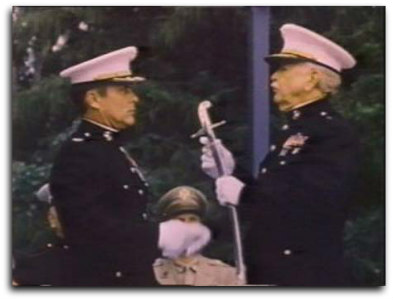
HOMEWesley Britton’s Books,
|
Spies on FilmSpies on Television & RadioSpies in History & LiteratureThe James Bond Files |
|
Spies on Television & Radio ~ Robert Conrad on the Past,
Present, and Future
By Wesley Britton Note ~ The original version of this interview was first published in the fanzine, Back to The Wild Wild West (Issue #109, 2002). Thus, it predated publication of my book Spy Television (Praeger, 2004). As a result, many references to that then-work-in-progress became outdated. In addition, I see now how the flow and organization of the piece could be smoothed and clarified, so below is a revision of the article while keeping all of Bob Conrad’s words intact. I have added details about broadcast dates and inserted details not in the first publication. 
Character actor Bill Erwin chats with Wes Britton at Elmira College, August 2001. In August 2001, I met a lively, cantankerous, and thoroughly loveable actor named Bill Erwin at a Mark Twain conference in Elmira, New York. Bill, I learned, had been a character actor for many moons with guest appearances on just about every Western ever made as well as Star Trek: The Next Generation, The West Wing, and The Tonight Show with Jay Leno. He’s something of a mainstay at Somewhere in Time conventions as he starred in that cult classic as well. I found out he’d guested on The Wild Wild West although he remembered little about it, thinking it was in the 1950s. Well, Bill was 87 when we met. (Erwin played the jury foreman in “Night of the Legion of Death,” 1967. He told me Ross Martin was “so talented” in that episode.) As we talked, I also learned Bill shares father-in-law duties with actor Robert Conrad, whom he described as a “mountain man.” Tim Erwin, Bill’s son, is married to Joan, Robert Conrad’s daughter. They have two children to whom Bill and Robert are grandpas. So I asked Bill if he’d help me get in touch with James West himself for a book I was working on. On January 21, 2002, contact was made. Some of the things Bob and I talked about have now been published in Spy Television – but other matters didn’t fit into what that book was all about. So I offer the entire interview here for the fans Bob Conrad clearly appreciates. Remembering WWW Robert Conrad’s first shot at television prominence came in 1959 in a role that was a clear precursor to his WWW character. Conrad had starred in Hawaiian Eye, a fusion of two detective romps, 77 Sunset Strip and Adventures in Paradise. Until the series’ cancellation in 1963, Conrad enjoyed fun-in-the-sun adventures with nightclub singer Cricket Blake, played by sex symbol Connie Stevens. Then, he took on his most successful TV role, that of Secret Service agent James West in The Wild Wild West, which ran on CBS from 1965 to 1970. That’s where our talk began, with Conrad praising Sue Kesler’s 1988 history of his show, The Wild Wild West – The Series (Downey, CA: Arnett Press). But he found one thing in the book surprising. In one interview, director Richard Sarafian said he didn’t think Conrad liked him and requested he not direct any further episodes after the pilot. Bob claimed this wasn’t true, adding he wasn’t going to go around and correct other people’s misunderstandings. “I’m not that kind of guy.” Then, Conrad had much to say about his WWW co-star, Ross Martin, and the rumors the two didn’t get along.
Over the years, some W3 fans have made it clear they don’t think highly of the reunion films Conrad and Ross Martin made including The Wild Wild West Revisited (1979) and More Wild Wild West (1980). But Conrad thought they were fun to make. When he and Martin did the original series, he said, “We were on a roll and we didn’t even know it. You know, we were the Chicago Bears in 1985 or ‘86 or whenever they won the Super Bowl. We didn’t know how good we were and what our rapport was as actors.” While the reunion films never “came up to the level of what we were doing . . . When we came back and tried to recreate it, you know, it was kind of like visiting the ex-wife. And she was still the wife, so it wasn’t so bad.” In fact, there was almost a third reunion film. Before Martin’s death on July 3, 1981, Danny Beiderman had written the script for Back to the Wild Wild West. After Martin’s passing, Beiderman re-designed the story as a tribute to Martin and got favorable response from Conrad. But CBS opted to do nothing further with The Wild Wild West. Bob told me he continues to enjoy fan response to the show and thanked writer Ann Teipen for publishing her fanzine, Back to The Wild Wild West, and maintaining her website devoted to the show. Fan interest is something, he said, you can take with you. “I’ll be 67 in March,” he noted, and because life is short, “it’s great to have a success like WWW in my past.” Conrad in the 1970s Because I was interested in the various TV spy series Bob starred in after WWW, I asked him about one show few remember – Assignment: Vienna, a short-lived series which ran on ABC from 1972 to 1973. Bob recalled the eight-episode series was first intended to be called Assignment: Munich and was to have starred Roy Scheider, later popular for his role in Jaws. Scheider didn’t want to do television, and “someone asked if I wanted to go to Vienna and I said, ‘Yea, I’m out of here.’” Conrad noted his show was part of a trilogy of action shows that alternated each week collectively called The Men. While his project got the ratings, the other efforts – including Sam Rolfe’s Delphi Bureau – didn’t. “It was a great experience,” Bob said, because he got to enjoy the delights of Vienna, notably Weiswine and going to the Prada. “I was overpaid,” he said, although he broke his neck doing a stunt and his stay was prolonged because of the accident. Nonetheless, Conrad stressed how much he enjoyed the time spent on the series. “I remember the fun times in Vienna and I got to go to the Winter Olympics in Munich.” Contrary to the myth that the show’s title was changed because of Palestinian “Black September” terrorist attacks at the Olympics, Conrad said it was because Vienna was more romantic, beautiful, known for waltz music, close to Strasburg, “a great city.” Munich, he said, “sounds too Aryan to me” and quoted some guttural German phrases to make his point. He said his character, Jake Webster, was very different from Jim West. “That guy ran a joint, a club, and was an agent!” Unlike James West, if Webster didn’t work for the government, he’d go to jail. Bob also enjoyed the various European guest actors who worked on the show. He praised the work of Charles Cioffi, who played Major Bernard Caldwell, Webster’s primary contact, and Anton Diffring, who played Inspector Hoffman of the Austrian police. “The show didn’t last, I was partying pretty good, it’s probably a good thing.” Regarding A Man Called Sloane (NBC, 1979-1980), Conrad had one word – “silly.” Again, the show had been originally planned for another actor – Robert Logan – who did the pilot. Logan was “a surfer, a good-looking kid, a tall, handsome boy and made a lot of family oriented movies.” According to Bob, “Fred Silverman didn’t particularly care for him in that role, and he said, ‘Go get Conrad.’ I never say no to anything.” Conrad laughed, and asked, “What’s the pay day? I did the math and went, ‘Yo Mama!’ I’m the king of second choices.” For the series, Conrad was both the impulsive Thomas Remington Sloane the 3rd, agent of UNIT, and director for one of the 12 episodes (“Shanghai Syndrome”). He admitted the series was “trite television.” Few would disagree with this assessment. The show was noted for gimmicks like a giant African-American assistant named Torque (Ji-Tu Cumbuka) with a mechanical hand, UNIT’s headquarters hidden behind a toy store in the manner of U.N.C.L.E.’s tailor shop, not to mention the split-skirts, nightgowns, and bathing suits of female guest stars like Morgan Fairchild and Edie Adams. As UNIT was apparently based in California – a wise move as most masterminds seemed to operate out of Las Angeles or San Francisco and were likely to threaten Nevada more so than the east coast – Sloane was most often found in beauty salons, health spas, and hot tubs. Most episodes ended with Sloane finally getting a romantic moment with one of these ladies just as the Director (Dan O’Herlhy) or Torque tracked him down with a new assignment. Even UNIT’s computer, “Effie”, had a sexy disembodied voice prone to flirt with her favorite agent despite the fact she was a “Series 3000 multi-function computer occupying 27 square feet and weighing six and one-half tons.” (Actor Roddy McDowell enjoyed the hammiest of the bad guy roles, playing Manfred Baronoff in “The Night of the Wizard.” This overt nod to The Wild Wild West featured McDowell doing his best to play a petulant, childish Miguelito Loveless impersonation in a story about exploding pellets and robots very reminiscent of Conrad’s first secret agent show.) Twenty-three years later, Conrad said he couldn’t say anything about the show with a straight face. “I was cute,” he says simply. And if he ever writes his memoirs, “which I won’t,” the series will go down as the silliest thing he ever did. On the other hand, Conrad was pleased with the one guest appearance he did for Mission: Impossible, remembering “the girl I worked with was John Peters’ wife. He was off-camera doing her hair. I’ve seen some of his movies and I think he probably gave up a good career. He should still be doing hair.” (The girl in question was singer-dancer Lesley Ann Warren, a short-lived member of the MI cast who also appeared on Assignment: Vienna. In the clever MI episode, “The Killing,” Conrad played Lorca, an assassin who worked randomly, making it impossible for the IMF to pre-plan their assignment to stop him.) Conrad on Classic Films, Violence, and Modern Television 
The fathers-in-law – Robert Conrad and Bill Erwin, circa 1985. Then, Conrad became his most philosophical reflecting on changing times. He said he personally identifies with actors of the past like Humphrey Bogart, Lauren Bacall, John Garfield, and Clark Gable. He said films from that era were classics, “what I enjoyed about movies years ago.” No one talks about them anymore, he regrets. “Now we know Tom Cruise, Brad Pitt, they’re not making the kinds of movies that have that kind of appeal anymore. It’s not their fault, they’re just not making those kinds of movies.” Summing up his career, he observed, “I had a fun time, I never took it seriously, and, for whatever reason, if I turn the TV on now, I’m on the air. The History Channel’s showing The Black Sheep Squadron as we speak,” he laughed. Like W3, Conrad said, Black Sheep Squadron was cancelled because of claims of violence. “I must be a violent guy because I keep getting cancelled because of my violence.” I asked how he feels now about violence on television, and he replied he didn’t care. “I’m not being cavalier . . . I judge what my children watch and I monitor what I watch. But I don’t care. Bureaucrats have no business in creative stuff. Bureaucrats should take care of so many other issues that are so much more important.” So what does he watch? “I love Fox News. I think Bill O’Reilly is a hoot. I don’t take him seriously. I think he’s hilarious. I think that’s a series. I don’t care about, say, Sex in the City,” he laughed, “I think it’s silly, silly, silly. I have better things to do with my time.” Bob compared his current state in life with our mutual friend, Bill Erwin. “I’m a boy next to him,” Conrad said. Unlike Erwin, who continues to act frequently and stars in a one-man show as Mark Twain’s younger brother, Conrad said he’s had a good run, is semi-retired, and has no intentions of dying on the stage. Which Bill, as anyone who knows him can attest, probably will. Bob noted that while Bill continues to do his Twain show, his own connections to the author are that his children attend Bret Harte Middle School and “there’s a Mark Twain cabin out here” in his Sierra Mountain neighborhood. “But I don’t want to do Mark Twain.” What did I learn from this short interview? Before I talked with Bob Conrad, I expected some version of the domineering, perhaps formidable, character who used to appear regularly on Bill Maher’s Politically Incorrect. Instead, the man I spoke with was kind and easy-going, squeezing this interview in while he waited for his ride to the airport on his way to Italy. Perhaps he was in a good mood – we both laughed through most of our talk. As I hung up the phone, I knew of the first change I had to make in my book. At one point, I said something like, “In those days, Conrad was young, wild, a man who loved wine, women, and wine.” My suspicion is that some things have changed – but Robert Conrad is a man still clearly enjoying life. More Bob Conrad and Bill Erwin Connections By Wesley Britton and Kevin Bochynski 
Robert Conrad and Bill Erwin in a scene from the TV movie Hard Knox (1984). After talking with Robert Conrad and hearing his thoughts on Bill Erwin, I couldn’t resist asking Bill his thoughts on Robert. Citing Bob’s role as the French-Canadian trapper Pasquinel in Centennial, Bill told me Bob Conrad is a talented actor who rarely shows what he is truly capable of. Bill said it’s ugly guys like himself who have to work as character actors because they can’t take the leading men roles offered to good looking guys like Bob who aren’t forced to develop their skills. Bill admitted the two actors are not close, but felt this was because Bob lives in a different part of the country. (Bill is based in L.A.) He added that their mutual grandson, Jesse, is following in the family footsteps. The teenager had just been accepted by the Hollywood Improv as a student. Bill Erwin and Robert Conrad have worked together on at least two other occasions beyond W3. On one episode of Mannix (“The Playground,” 1969), Conrad was the guest star playing an action hero much like his most famous roles. Bill played the studio prop man who last handled the supposedly empty rifle which nearly killed Conrad’s character on the set. In Hard Knox (a 1984 made-for-television film, evidently a series pilot), Bill played a retired General and founder of a military school that Conrad took over upon his retirement from active duty. According to Kevin Bochynski, creator of the Bill Erwin website, the two men have some good scenes together in the film. Joan Conrad Erwin, Jesse’s mom, also followed the family tradition. She is a recognized stuntwoman, director, and producer. Her credits include ~
More information about Bill Erwin, his family, and his work can be found on Bill’s personal website, the Bill Erwin Home Page. Photographs courtesy of Kevin Bochynski. |